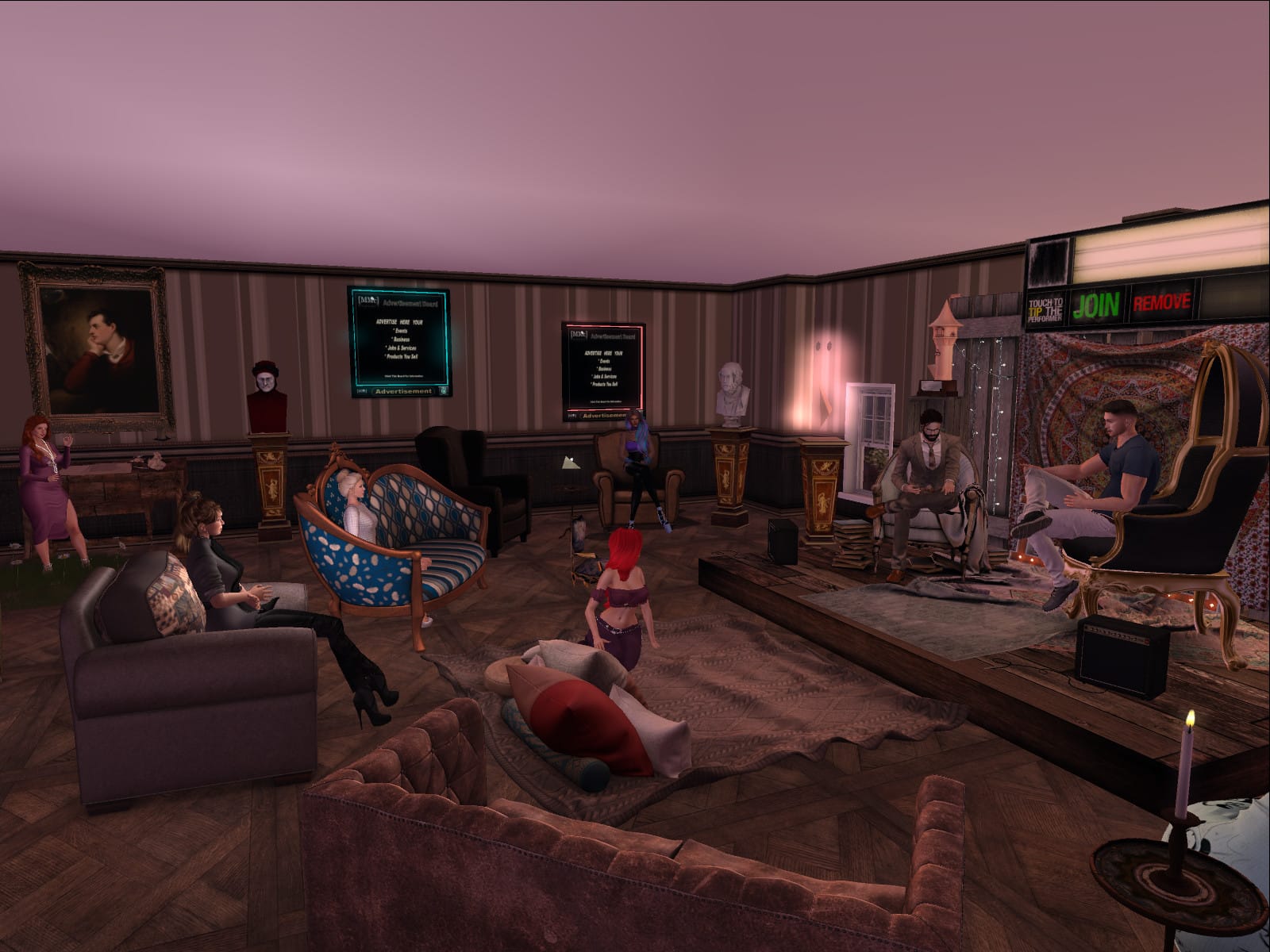
We speak to Adam Gary, founder of an online community of poets, The Poetry Cove, to discover how his group is using virtual reality to perform together – something we couldn’t resist attending ourselves, inside the ‘metaverse’.

Adam Gary, founder of The Poetry Cove.
A growing chasm is dividing our world between the real and the virtual. Cryptos, NFTs, the metaverse, which last year Mark Zuckerberg staked his digital claim to, by renaming his multi-billion-dollar company ‘Meta’. These are just some of the growing developments that continually appear to define our times.
To some, they’re an alien advancement, concocted by bad faith actors; to others, they present a real opportunity to devise a new way of operating in the world, one free of governments and established order; and to others, still, they’re simply a passing technological fad – ones that will fade like MySpace, the Nintendo Wii, and, more recently, Blackberry’s BBM. All in all there’s a conflict between our physical reality and the digital realm.
This was a meeting of two worlds: Zuckerberg versus Yeats; Byron versus Bathing Apes; T.S. Eliot versus @EllioTrades
So, when a press release citing how the world’s largest forum of poets – a group, presumably, interested in our physical reality, just as the heroes of their beloved artform did – have sought to embrace the metaverse arrived in my inbox, I was more than a little curious. It struck me as a meeting of two worlds: Zuckerberg versus Yeats; Byron versus Bathing Apes; T.S. Eliot versus @EllioTrades.
The Poetry Cove is an online community of over 2,500 members from around 61 countries. Like many creative outlets, it was spawned from the tedium of lockdown, out of the desire of poets to still convene and share each other’s work when meeting-up was prohibited (save for a few cake-loving MPs – reportedly, of course, my lawyer has advised me to add).

Zuckerberg changed his company’s name to ‘Meta’ last year.
Its founder, Adam Gary, a former actor until ‘imposter syndrome and anxiety’ meant he gave up such a path, tells me his initial aim was to create a platform that would allow others to give poetry a go, in much the same way it gave him opportunities to still be expressive.
‘I’ve always had something to do with poetry inside me. I’ve never been a conventional person; I’ve never really gotten on with academia and institutions. I’ve always just gone about things my own way. So I’m completely self-taught with poetry. And I started a YouTube channel on how to write poetry.
I’ve never been a conventional person, I’ve never really gotten on with academia and institutions
‘I just noticed, from many of my followers, the thing about artists is we’re very insecure. It’s not very often we believe in ourselves… I realised there are so many people that are in the same boat that I was when I first started. There’s that very raw want and need to write poetry and to try and make something; but there isn’t really a place that people can just come to, without any pressure, any sort of experience or accolades or achievements, to be a part of.
‘And so that’s how I started The Poetry Cove, because I just saw a lot of myself in all these people, knowing deep down that poetry is what they want to do, but not knowing how to go about it. They can just come and be and share as much or as little as they like.’
ArrayAnd whilst some have derided the emotionless, copy and paste job of poetry on social media platforms, for Adam it’s been a marriage that has rejuvenated the poetry community.
‘The last few years, we’ve seen a rise in popularity in poetry, thanks to Instagram. The thing about what we do is it all comes down to other people validating it, such as publishers or agents. But, with Instagram, people are able to share their work without having to get that acceptance from other people, which is a big reason why poetry has spiked in general.’
With Instagram, people are able to share their work without having to get that acceptance from publishers or agents
Indeed, his words are backed by the numbers. Last year, the site ‘Poets.org’, which publishes a daily poem, saw an historic spike in website traffic. This was driven in part by Amanda Gorman’s poem delivered at US President Joe Biden’s inauguration – making her the youngest inaugural poet in US history, at just 22 years-old, and further indicating that poetry is having something of a renaissance.
As if to highlight the link between poetry’s (re)rise and the online world, Gorman is reported to have gained more than 2 million Instagram followers on that day (20th January 2021) alone.

In its first iteration, The Poetry Cove was not too dissimilar from the experience of something like ‘Poets.org’, with poems for all occasions and sensations stored across numerous categories in digital folders. This format, without ‘any sort of complicated algorithms to deal with’, Adam explains, suited the group well initially, ‘because a lot of members are just trying to make a name for themselves’, and don’t get penalised for not having any online clout.
But now, almost exactly a year since it was founded, The Poetry Cove is on the rise – not just numerically through its membership, but virtually too, ballooning outward from the 2D forum format into the 3D-like space of the metaverse, allowing members to read and perform to each other online from any part of the (real) world.
…ballooning outward from the 2D forum format into the 3D-like space of the metaverse
Quick note. Let’s be clear what we mean by the metaverse. First credited to Neal Stephenson’s 1992 sci-fi novel, Snow Crash, the term denotes a virtual reality space in which users can interact with a computer-generated environment, and with others within that space.
The type of headset Zuckerberg’s Oculus company, among others, have been devising allows for a VR experience that feels like you are embedded within the virtual landscape, able to see and interact with this space in 360°.

What The Poetry Cove have been using is a platform called Second Life, which, interestingly, already grew mainstream popularity by the late 2000s with millions of users devoting hours of their lives to living – as its title suggests – a second virtual life.
So whilst the technology may be somewhat limited, it still represents one of the first forms of this metaverse. In fact, the founder of Second Life, Philip Rosedale, announced only a matter of weeks ago that he was returning to the project as a strategic adviser to help further develop the platform’s metaverse ambitions. In many ways, Second Life, originally founded in 2003, was the first mainstream metaverse platform – it just didn’t make a big song and dance about it.
For one thing, Adam says that the platform has had significant real-world impacts on his life
When Adam asked me to join along to one of their poetry readings on the platform, therefore, it was hard to refuse out of sheer curiosity. For one thing, Adam says that the platform has had significant real-world impacts on his life.
‘The funny thing about Second Life,’ he explains, ‘was that I was actually a member of it, years and years ago. And through COVID, I actually met my current girlfriend who lives in America, and then thought, “Okay, well, this is long-distance, how can we make it easier?” and Second Life just came into my mind.

‘And so I got Sophie to download Second Life. And it just dawned on me this is an opportunity. We can make something really unique and special here because I don’t know of any other poetry company utilising Second Life at the minute.
‘Just being able to have that avatar in front of you, really does add a whole different level to things rather than just reading texts and seeing a profile picture. You can hear people’s voices, and you can make some really strong connections. I know someone who met his wife on Second Life back in the day – they’ve now got a kid and a house together and everything.
Everything is made by someone behind their computer, so the possibilities are just absolutely massive
‘Everything is user-made – everything is made by someone behind their computer. And so the possibilities are just absolutely massive.’
Sure enough, every Friday from 10pm-11pm (set more conveniently at 2-3pm PST), the Poetry ‘Covers’ assemble in a small virtual house built on Second Life. Plunged into it, I waited downstairs. Images of poets adorned the wall: Oscar Wilde, Emily Dickinson and Carol Ann Duffy. A voice rang out – one I recognised – ‘join me upstairs and we’ll get started’. It was Adam.

I followed his avatar upstairs, a well-built, long-haired, spectacled figure with red braces. The superficial sound of fire crackled, intending to provide a sense of warmth and cosiness. In truth, like any placebo, it did a decent job.
More people soon followed, until the point where I felt genuinely uncomfortable being the only one standing in the room, so hovered over a virtual beanbag and clicked on the ‘chair’ symbol to sit down – my little avatar (me, I had to contend) obeyed.
The superficial sound of fire crackled, intending to provide a sense of warmth and cosiness – in truth, it did a decent job
Adam, or ‘Diablo Guffrey’, as I soon found his moniker to be in this strange virtual world, took to the wooden stage and began talking. ‘Hello everyone, welcome. Hello, Teddy, thank you for joining,’ he said, making me sit-up as though I were really in the room with everyone, ‘We’re just going to give it five minutes until more people join and then we’ll make a start.’
Five minutes went by, in which I scanned the room, circling my view with my keypad. It was all the small features that brought this place to life. The sheets of paper on the mantelpiece, the scuffed carpet on the stage, the framed image of Byron staring intensely from across the room. What would he make of all this?

I spotted Sophie (or ‘Scarlette’, as her name was here), who in turn was staring up at ‘Diablo’. Even more people joined, their names filling my screen, to give the impression of a full room. My computer began whirring with the heavy workload of a digital world – a rattling sound as if it were getting used to this new order. An elongated sigh.
Then ‘Diablo’ began, opening with ‘Esther’s Tomcat’ by Ted Hughes, his voice soft and soothing as he spoke into the mic. People could click on a board that hung over his head, and request to perform next and, one by one, a range of poems spoken in a variety of accents soon purred from my screen, the sound of the flickering fire intensifying with them. Before long, just as Adam had said, I did feel the sensation of being in a room.
If stage nerves often get the better of you, then what better place to perform
Not every minute, of course. At times I was ironically distracted by my real phone – though, in truth, aren’t we all often distracted by our phones? Would it have been any different had I actually been in a room? Others had issues with their mics, with some barely registering a noise. But how does that compare to someone simply speaking quietly?
At one point I even felt inclined to deliver a poem – but other more serious readers had formed a long queue ahead of me, one that would already take us past the hour. It struck me that if stage nerves often get the better of you, then what better place to perform. Just as Adam had told me, this virtual room offered ‘a stepping-stone for many of our members because there is a certain safety blanket behind it, with you being behind a screen and just reading.

‘And although there is a live audience,’ he added, ‘it’s easier to block that out when you look down to a book and just start reading as long as you’ve got your mic turned on. A lot of people are now going to live open mics and readings because they’ve used our open mics first.’
‘Diablo’ closed the night with Shakespeare – his favourite poet – and his Sonnet 18. ‘I’d like to think the guy was an innovator,’ he told me prior, ‘he was a businessman, he ran a theatre company. I think he would really enjoy the imagination of Second Life and the possibilities and the creative side of things on it. I’d like to think he would be all about Second Life.’
Indeed, it feels as though a change of seasons is in the air.
Rough winds do shake the darling buds of May.
With new technologies colliding with old-fashioned traditions. But with people like Adam wanting to embrace the technology, it’s provided new opportunities for his group of poets.
So long as men can breathe or eyes can see,
So long lives this and this gives life to thee.
And that, if you will, is a Second Life.


